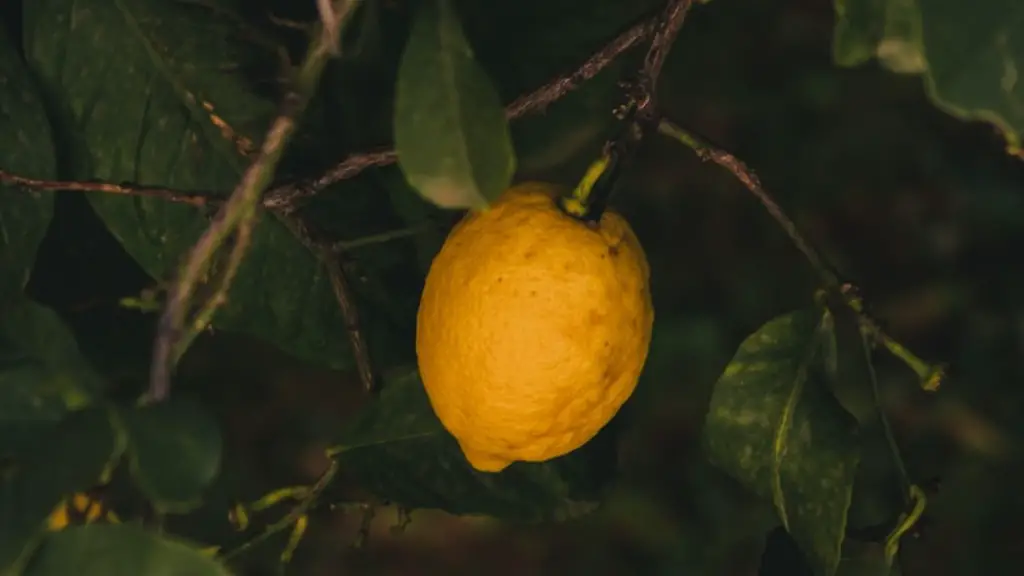Lemon trees are a beautiful addition to any garden, and add a bit of personality to the landscape. The question of how much is a small lemon tree can be a tricky one to answer, as there are a number of factors involved. It depends on the variety of tree, the seller, location, and more. Let’s take a look at what you should consider to find out how much a small lemon tree will cost.
The most important factor to consider when pricing a small lemon tree is the variety. For example, Meyer lemon trees cost significantly more than Eureka lemon trees. On average, Meyer trees cost around $30-35, while Eureka trees are normally around $15-20. If you are looking for a true dwarf lemon tree, you may be looking at paying around $45-50.
Location can also play a major role in the cost of a small lemon tree. If you are buying directly from a nursery, you can expect to pay more in larger cities and less in more rural areas. Buying from a farmer’s market or other local seller can oftentimes yield lower prices as well.
Another thing to consider is whether you are buying a small tree that is already rooted in the ground, or one that is still in a pot or container. Small trees in the ground will be more expensive than those that are not, usually costing around $25-30. Those in containers, however, will usually cost less, around $20-25, depending on the size.
Finally, it is important to think about how many years the tree has been in the ground or container. The longer the tree has been in its current location, the higher the price will likely be. For example, a tree that has been in the ground for 3 years may cost more than one that is only 1 year old, as it is more established and may have even produced a few lemons already.
Sun and Shade for Your Lemon Tree
Before ordering your small lemon tree, it is important to consider where you will place it within your yard or garden. Lemon trees prefer warm climates, and need to be in direct, direct sunlight for at least 8 hours a day. If planted in partial shade or full shade, it will still grow, but it may produce fewer lemons. Additionally, make sure that the soil is well-draining, as water retention can lead to disease or rot and should be avoided.
Pruning and Care of a Small Lemon Tree
If you want to get the most out of your lemon tree and maximize its production, regular pruning is a must. Lemon trees benefit greatly from pruning in early spring and late winter. Pruning helps stimulate new growth and leads to a fuller, healthier tree. Additionally, make sure to fertilize your lemon tree during the growth season with a nitrogen-rich fertilizer. Every few weeks is best.
Harvesting Lemon From Your Small Tree
Once the tree starts to produce lemons, it is important to monitor their ripeness. A ripe lemon should be close to its full size, have a deep yellow color, and be firm to the touch. When picking a lemon, it is a good idea to use scissors or a sharp knife and to avoid pulling the fruit off by hand. This can lead to injuries, as the fruit can hold onto the stem quite tightly.
Pest Prevention For Your Small Tree
In order to keep your lemon tree healthy and producing an abundant crop of lemons, it is important to be aware of common pests and diseases that affect lemon trees. The most common pests are aphids and scale, both of which can cause serious damage if left unchecked. The best way to prevent these pests is to keep the yard and surrounding area free of debris and to inspect the trees regularly for any signs of infestation.
Storing and Preserving Lemons
When harvesting lemons from your small tree, it is important to know how to properly store and preserve them. Lemons should be stored in an airtight container in the refrigerator. If you are planning on using the lemon for future use, you can also freeze the juice to help preserve it. Wrapping the lemons in paper towels also help keep them fresh for a longer period of time.
Keeping Your Lemon Tree Healthy and Happy
When caring for a small lemon tree, it is important to give the tree enough water and nutrients, as well as to keep the tree free of weeds and debris. Mulching the soil helps retain moisture and keeps the roots of the tree cool. While lemon trees are hardy plants, they do benefit from some occasional pruning and fertilizing. Lastly, it is also important to inspect the tree regularly for any signs of pests or disease, such as aphids and scale.

